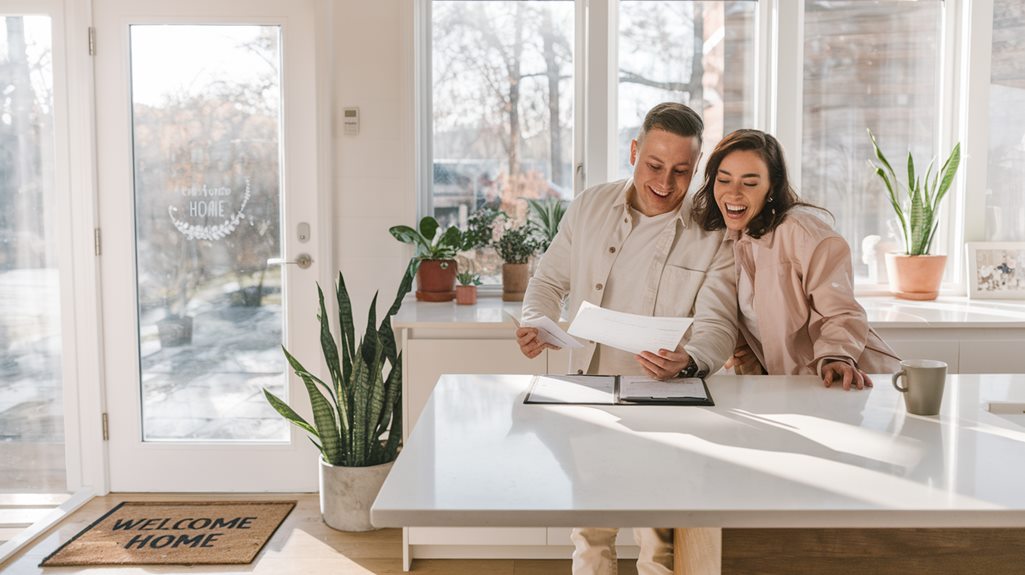Are you ready to buy your first home? That's exciting! First, take a good look at your money. You need to know how much you can spend.
Next, try to make your credit score better. This will help you get a loan. After that, find a good real estate agent. They can help you find the right house in a nice neighborhood.
When you find a home you like, make an offer to buy it. Be sure to get a home inspection. This will help you find any problems with the house.
After that, get your loan ready and get through the closing steps. Finally, do a last check of the house before you move in.
Each of these steps is important. If you follow them, buying your first home will be easier and more fun! Want to learn more tips?
Ready to start building equity in your own Michigan home? Get your personalized home loan quote today.
Assess Your Financial Situation

Before you start looking for a home, it's important to check your money situation. Take a good look at how much money you make and see if it's enough to buy a house.
Try to write down what you spend each month. This will help you see where your money goes and how to keep your debts in check.
To save for a down payment, you can set up a special bank account and have money go into it automatically. This makes saving easier!
Also, check your credit score. This score shows how lenders see you and can help you fix any problems.
Think about how to grow your money too, so you feel more secure.
Michigan residents, unlock the door to your new home. Request your home loan quote from Treeside Financial today.
Determine Your Budget
Making a budget is really important when you want to buy a home. Start by looking at how much money you have and how much you spend each month. Write down all your expenses. This will help you see where you can save money. Knowing your spending will make sure you don't spend too much.
Think about how much money you earn each month, your bills, and what you need to live. This will help you make a budget that works for you and your dream of owning a home.
Try to spend no more than 30% of your monthly money on housing. This includes your mortgage, insurance, and taxes.
Get Pre-Approved for a Mortgage

Getting pre-approved for a mortgage is an important first step in buying a home. It shows that you're ready to buy and tells sellers that you mean business.
You might be closer to buying your home than you think
Take our 2-minute home buyer readiness quiz to see how prepared you really are – no credit check required.

Start by checking your credit score. This score can affect the interest rates and loan terms you get.
Next, learn about the different types of mortgages to see which one fits you best. It's also helpful to look at your debt-to-income ratio. This helps you understand how much you can afford.
To get pre-approved, you'll need to gather some documents, like your pay stubs and tax returns. This shows lenders that you're financially ready.
It's smart to compare different lenders because they all have different terms and interest rates. This can change how much you pay each month.
Research Potential Neighborhoods
When you start looking for a new home, it's really important to check out the neighborhoods first. Look at what the area has to offer, like parks and stores. Good schools are also super important because they can help your kids learn and grow.
Make sure to check how safe the neighborhood is by looking at crime rates, so you feel safe and happy.
Think about what changes might happen in the future. New buildings or shops can change how the neighborhood feels. Check how easy it's to get to places, like work or school.
It's nice to have fun places nearby, like playgrounds or sports centers, where you can hang out and meet friends.
Hire a Real Estate Agent

Once you've looked at different neighborhoods and found places you might like to live, it's time to get help from a real estate agent. These agents know a lot about buying homes and can make the process easier for you. A good agent will share useful information and help you negotiate, so you can get the best deal. You want someone who understands what you need and makes you feel comfortable during this big step.
Here's how an agent can help you:
| Task | Agent's Role | Benefit to You |
|---|---|---|
| Property Search | Find homes for you | Save time and worry |
| Market Analysis | Share important facts | Help you decide better |
| Offer Negotiation | Talk about prices | Get good deals |
| Legal Assistance | Help with paperwork | Prevent mistakes |
| Closing Process | Help finish everything | Make it easy to move in |
Picking the right agent is an important step toward owning your new home!
Start House Hunting
Starting your journey to find a new home can be exciting! It's important to know what you really want. Think about the things that are most important to you in a house. Do you want a big kitchen or a nice backyard? Knowing what you like will help you find the right place faster.
Don't forget about the neighborhood! Look for things that make it a great place to live, like parks, schools, and stores close by.
Here's a simple plan to help you:
- Make a List of Must-Haves: Write down the things you really want in a house.
- Check Out the Neighborhood: Look for nearby playgrounds, schools, and shops.
- Set Your Budget: Decide how much money you can spend so you don't worry later.
- Visit Open Houses: Go see different homes to learn about what's out there.
Happy house hunting!
Make a Competitive Offer

You've found a home you really like, and now it's time to make an offer that stands out! To make sure your offer is strong, start by thinking carefully about how much to bid.
Look at what similar homes have sold for nearby, how many people want homes right now, and how long homes have been for sale. This information will help you decide a good offer price.
Talk with your real estate agent. They can give you tips on what the seller wants besides just money.
Maybe they'd like to close on a certain date or want fewer conditions. Remember, a good offer shows you can pay, but it also shows you really want to be part of the neighborhood!
Schedule a Home Inspection
Scheduling a home inspection is super important when you're buying a house. It helps you avoid surprises and gives you peace of mind.
Here are some reasons why a home inspection is a good idea:
- Save Money: Find problems that you can't see before you buy the house.
- Better Deals: If the inspection shows issues, you can ask the seller to fix them or lower the price.
- Plan for the Future: Learn what you need to take care of in the house later on.
- Feel Safe: Know that you made a smart choice and feel good about your new home.
Secure Your Financing

When you're getting money for your home, look at different types of loans. This helps you find the best one for you.
Make sure your credit score is good. A good score can help you get better loan terms and lower interest rates.
Lastly, think about how much money you can pay each month. This way, you'll feel good about your mortgage payments in the future.
Explore Loan Options
Getting a home loan can feel scary, but it's important to know your choices. This will help you find the best way to pay for your new home. Here are some options to think about:
- Fixed Rate Mortgages: This type is good if you want to keep your payments the same every month. It gives you a steady interest rate.
- Adjustable Rate Loans: This option starts with a lower rate, but it can change later. It's a good choice if you plan to move or change loans soon.
- Government Programs: Look into FHA, VA, or USDA loans. They can help with down payments and usually have easier rules.
- Loan Comparison: Check out different loans to see which has the best interest rates, insurance, and closing costs.
Improve Your Credit
To get a loan, you first need to have good credit. Start by checking your credit report to make sure everything is correct. If you see mistakes, let them know! Mistakes can lower your credit score, and a good score helps you get better loan deals.
Next, look at how much credit you're using. Try to keep it below 30% of what you can borrow. This shows you're good with money. Lenders want to see that you can be trusted to pay back a loan.
Paying your bills on time is really important too. It helps your credit score go up, which makes it easier to get money when you need it.
Having good credit not only helps you buy a home but also keeps your finances stable.
Calculate Affordability Limits
Thinking about buying a home? It's important to know how much you can afford. Here are some easy steps to help you:
- Look at Your Money: Check how much money you make and how much you spend. This helps you see where your cash goes.
- Make a Budget: Write down all your expenses. This way, you can see if you can pay for a mortgage without stressing out.
- Check Your Debts: Look at any money you owe. This can help you get a better loan, and lenders want to see that you don't owe too much compared to how much you earn.
- Save Money: Start saving for your down payment and any extra costs that might come up.
- Know the Market: Keep an eye on home prices and trends. This will help you understand if it's a good time to buy and meet your money goals.
Close on Your New Home
As you get ready to close on your new home, make sure to do a careful final walk-through. This helps you check that the house is in good shape and meets your hopes.
On the big day, you'll look at and sign important papers, like the settlement statement. This shows that all the money parts are right.
If you stay organized and know what's happening, you can get through this big step with confidence and feel good about it!
Final Walkthrough Checklist
You're almost at the front door of your new home! Before you go in, it's really important to do a final walkthrough. This is your last chance to make sure everything is just as you expected.
Here's a simple checklist to help you:
- Check Repairs: Make sure all the repairs that were promised are done and look good to you.
- Test Systems: Try out the heating, air conditioning, plumbing, and electricity to see if they work.
- Look at Appliances and Fixtures: Make sure the appliances and light fixtures are in place and working well.
- Look for Damage: Check the walls, floors, and ceilings to see if there's any new damage since your last visit.
Doing this step will help you feel happy and safe in your new home, and excited to be part of your new neighborhood!
Closing Day Documents
Are you ready for the big day? Closing day for your new home is exciting! To make sure you're all set, follow this simple checklist.
First, check the title to make sure you really own the home. Look at the title insurance too. It helps protect you if there are any surprise claims later.
Next, know your closing costs. These are important to finish the deal. Don't forget about the notary! A notary is a person who'll watch you sign your papers.
Make sure you understand how the deed transfer works. This is how the home officially becomes yours.
Remember your rights as a buyer. They help keep you safe during this process. Check that the settlement date works for you.
Lastly, make sure the loan payoff is correct so you can enjoy your new home. Following these steps will help you feel good about being a homeowner!
Settlement Statement Review
If you're a new homeowner, it's really important to understand your settlement statement. This paper helps you see where your money is going and makes the closing process easier.
Here's how to look at it like a pro:
- Know the Fees: Learn about common costs like loan fees, appraisals, and title insurance. This way, you can find any mistakes.
- Check the Numbers: Make sure all the math is right. Mistakes can cause surprises you don't want.
- Look at Prorations: Things like property taxes and homeowner fees are split between you and the seller. Check that they're divided correctly.
- Confirm Changes: Find any credits or changes you agreed on and make sure they're shown correctly.








